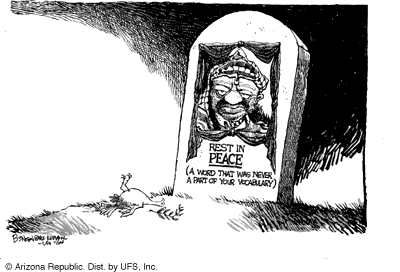Many Names, Many Deaths
Rahman Abdel-Raouf Arafat Al-Qudwa
Also known as Abu Ammar
Also known as Al-Hussaini
Also known as Yasser Arafat
Also known as Muhammad Abdul Raouf Arafat
al-Qudwa al-Husseini
(1929 - 2004)
Also known as Abu Ammar
Also known as Al-Hussaini
Also known as Yasser Arafat
Also known as Muhammad Abdul Raouf Arafat
al-Qudwa al-Husseini
(1929 - 2004)

Mohammed Yasser Abdul-Ra'ouf Qudwa Al-Husseini, more commonly known as Yasser Arafat was the fifth of seven children born to a Palestinian textile merchant on August 24, 1929. According to Arafat and other sources, he was born in Jerusalem; however, French biographers, Christophe Boltanski and Jihan El-Tahri revealed in their 1997 book, Les sept vies de Yasser Arafat, that he was actually born in Cairo, Egypt, and that is where his birth certificate was registered. The Palestinian Academic Society for the Study of International Affairs also lists Arafat’s birthplace as Cairo. Ian Pacepa, a former Romanian intelligence official, disclosed that the KGB had invented a background for Arafat with a birthplace in Jerusalem.
Claims that Arafat was related to the Jerusalem Husseini clan through his mother have been disputed by the Palestinian historian Said Aburish. In an unauthorized biography, Aburish claims that “The young Arafat sought to establish his Palestinian credentials and promote his eventual claim to leadership... [and] could not afford to admit any facts which might reduce his Palestinian identity. ...Arafat insistently perpetuated the legend that he had been born in Jerusalem and was related to the important Husseini clan of that city.”
Arafat’s childhood was divided between Cairo and Jerusalem, where he lived for four years with an uncle following the death of his mother when he was five. Arafat attended the University of King Faud I (later renamed Cairo University).
During the 1948 Arab-Israeli war, Arafat left the university and, along with other Palestinians, sought to enter Palestine to fight for Palestinian independence. He was disarmed and turned back by Egyptian military forces that refused to allow the poorly trained partisans to enter the war zone. After returning to the university, Arafat joined the Muslim Brotherhood and served as president of the Union of Palestinian Students from 1952 to 1956. By 1956, Arafat graduated with a bachelor’s degree in civil engineering and served as a second lieutenant in the Egyptian Army during the Suez Crisis.
After the Suez War, Arafat moved to Kuwait, where he found work as an engineer and eventually set up his own contracting firm. In Kuwait, he also helped found Fatah in 1957, an organization dedicated to the establishment of an independent Palestinian state in place of Israel and Jordan (i.e., historic Palestine).
In 2003, a team of American accountants hired by the PA finance ministry began examining Arafat’s finances. The team determined that part of the Palestinian leader’s wealth was in a secret portfolio worth close to $1 billion — with investments in companies like a Coca-Cola bottling plant in Ramallah, a Tunisian cell phone company and venture capital funds in the U.S. and the Cayman Islands. The head of the investigation stated that “although the money for the portfolio came from public funds like Palestinian taxes, virtually none of it was used for the Palestinian people; it was all controlled by Arafat. And none of these dealings were made public.”
The International Monetary Fund (IMF) conducted an audit of the Palestinian Authority and discovered that Arafat diverted $900 million in public funds to a special bank account controlled by Arafat and the PA Chief Economic Financial Advisor. It was, therefore, not surprising when Forbes ranked Arafat sixth on its 2003 list of “Kings, Queens and Despots,” estimating his personal wealth at a minimum of $300 million.
In 1990, Arafat, a Sunni Muslim, married Suha Tawil, a Palestinian Greek Orthodox Christian who converted to Islam before marrying him. At the time, Arafat was 62 and Suha 28. Suha's mother, a Palestinian activist and writer, introduced Arafat to her daughter, who was then studying at the Sorbonne. Arafat subsequently hired Suha to work on his personal staff in Tunis. In July 1995, the couple had a daughter Zawha, named after Arafat’s deceased mother. After the start of the second uprising, Suha moved to live with her mother and daughter in Paris.
Arafat, who survived several assassination attempts over the years, as well as a helicopter crash, had been in failing health for some time when his conditioned worsened in October 2004. Israel agreed to allow him to be transferred to a hospital in Paris on October 29 where his wife stayed by his side. He died November 11, 2004, at age 75. LINK
Say, have you heard the one about Yasser Arafat...?
The soothsayer looks into her crystal ball and says,
"Yasser, Yasser ... You will die on a Jewish Holiday."
Arafat looks up startled and says,
"A Jewish Holiday? Which one? Purim, Rosh HaShanna, Chanukah?"
The soothsayer looks him right in the eye and says,
"Yasser, Yasser, any day you die will be a Jewish Holiday."
The real punchline...
Mr. Al-Qudwa/Al-Hussaini/Arafat's life story will forever be written in the blood and the tears of innocents.







0 Comments:
Post a Comment
<< Home